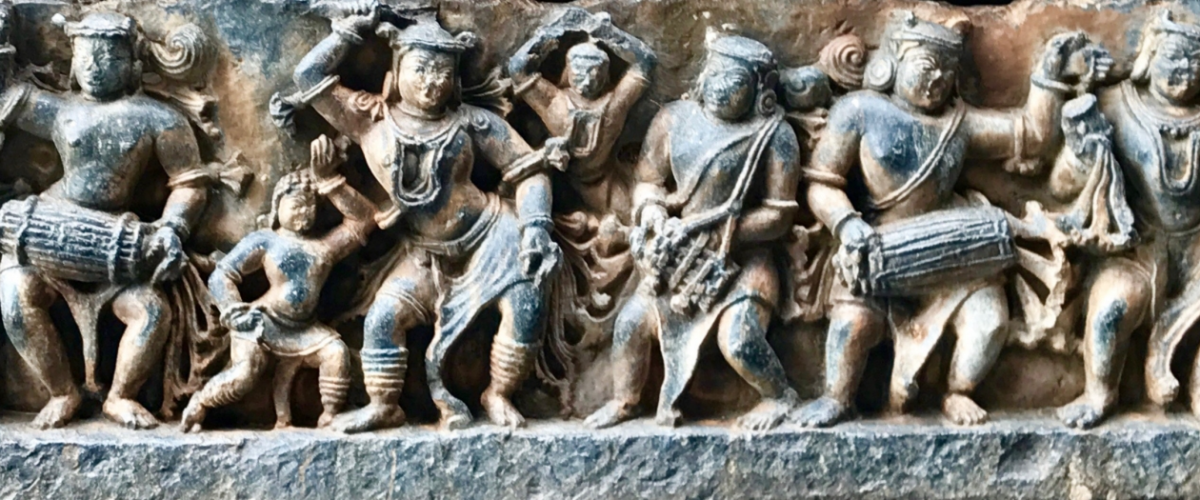

It is generally believed that Indian classical music has its origins in the religious observances of the Aryan people who arrived in India some 3,000 years ago, pushing India’s local population, known as the Dravidian people, southwards. The exact origins of the Aryans remain shrouded in mystery but history has recorded them as ‘fair skinned’ or, at any rate, lighter skinned than the Dravidians and possibly originating from Persia (modern-day Iran), or South-central Asia.
The Aryans brought with them their sacred texts known as the Vedas, meaning 'knowledge’ forming the core of ancient Hindu scriptures with their worship rituals largely centering on the highly structured and organised recitation of these verses. There are four main Vedas, of which the one known as Samaveda (from saman, roughly translating to ‘melody’) is the most relevant - as the texts contained in it were clearly meant to be sung whilst also acting as treatises about music, dance and theatre.
The exact purpose of the chanting rituals may have been varied – from revering the forces of nature, always a paramount concern in largely agrarian societies, to performing sacrificial rites – but there was always a strictly prescribed formula for specific verses and particular scenarios. Three main pitches (or tones) of voice were used to enunciate the words including a prescribed length of time for sustaining a given syllable – and this was then further elaborated by numerous combinations and permutations of those pitches and accents.
It was vital to use the correct pitch and emphasis parts of the text and, in time, these various combinations evolved into something known as jati (literally ‘variety’ or ‘types’), a forerunner of raga (melodic structure). It is thought that the three prescribed pitches (and their numerous permutations) gradually became the seven notes of today's raags.
Ancient musical treatises show that by 300 BC, there was already a marked difference in classification for what was known as marga sangeet (music of the gods) and desi sangeet (music of the people). The latter formed the basis for what evolved as folk music, varying region by region, but the former remained the sole domain of those who were considered adequately trained by a master.
There were families of priests and learned men who initiated disciples into the tradition of recitation, a system that has survived to the present day and, until comparatively recently, was also the only acceptable way to learn Indian classical music.
Whilst melody and raga went on to evolve down the centuries, the original recitation style of the Vedas has been preserved by being orally transmitted through generations and may still be heard – more or less in its (presumed) original form – at Hindu weddings, funerals and other ceremonial occasions.
Listen to the music | Pelva Naik sings Dhrupad - India's oldest form of classical raag-based singing. This is her candlelit solo rendition of Raag Jog, replete with slow slides, meditative microtones, and patient melodic elaboration. Filmed by Darbar in 2015, on location in India.
Jameela Siddiqi is an author, linguist, and BBC cultural commentator, specialising in postcolonial fiction and the devotional music of South Asia.
Darbar believes in the power of Indian classical music to stir, thrill, and inspire. Explore our YouTube channel, or subscribe to the Darbar Concert Hall to watch extended festival performances, talk and documentaries in pristine HD and UHD quality.
Darbar's resident yoga teacher Kanwal Ahluwalia has transformed her life through yoga; here's how she did it and you...
Read More 
The conventions of concert etiquette for Western classical music are a little daunting. Don't breathe heavily. Don't...
Read More 
The santoor is an ancient folk instrument thought to have originated in Persia, from where, according to some...
Read More 
The beginner's guide to Indian classical music. Whether you’re completely new to raga music or just need a refresher, we’ve put together this brief overview of all things raga music to help you feel at ease when visiting one of our concerts or watch our videos on our YouTube or our Darbar Concert Hall.

Keep up to date with the latest news, events, music and musings across our social channels
For hundreds more clips and shorts, vist our YT page here 
Be the first to hear before events go on sale. Get the latest news and articles from Darbar